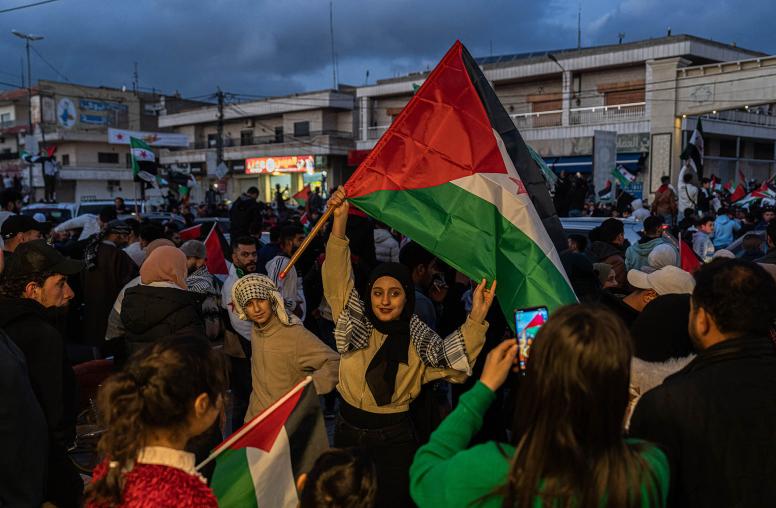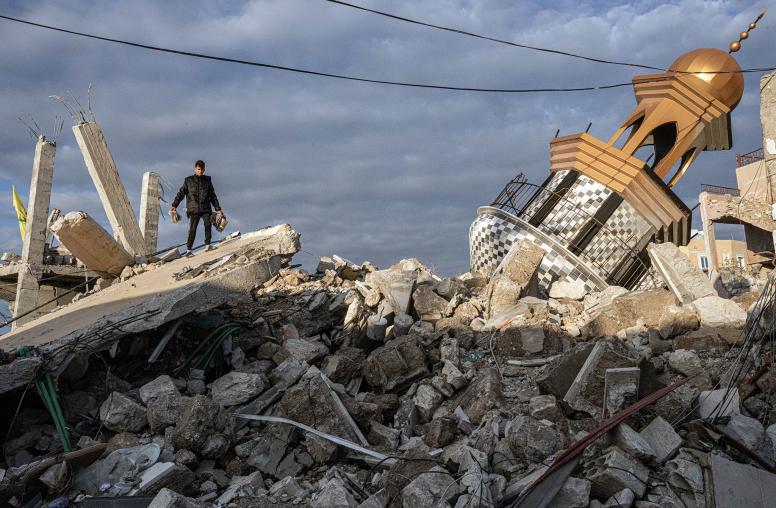Lebanon's Parliamentary Elections
Lebanon's pro-Western bloc, known as the "March 14" coalition, will retain control of the country's government despite a strong challenge from a Hezbollah-dominated alliance, according to results from the June 7 parliamentary elections. USIP's Mona Yacoubian examines the electoral results, and what they suggest about support for Hezbollah, and the country's future direction.
 Lebanon's pro-Western bloc, known as the "March 14" coalition, will retain control of the country's government despite a strong challenge from a Hezbollah-dominated alliance, according to results from the country's June 7 parliamentary elections.
Lebanon's pro-Western bloc, known as the "March 14" coalition, will retain control of the country's government despite a strong challenge from a Hezbollah-dominated alliance, according to results from the country's June 7 parliamentary elections.
Mona Yacoubian, a special advisor to the Institute's Muslim World Initiative, examines the high stakes of Lebanon's elections, what the results suggest about the level of support for Hezbollah and the country's future direction.
- Why are these parliamentary elections significant? What do you make of the results in general and of the voter turnout? Does this signal waning support for Hezbollah (and its coalition in parliament) in Lebanon?
- What are the next steps in Lebanon following the election?
- What does this suggest about the influence of Iran and Syria in Lebanon?
- What are the implications for Lebanon's relations in the Middle East, as well as Lebanon's relations with the West, including the U.S.?
- Do you think President Obama's speech in Cairo had any influence on the elections, and voters' decisions?
Why are these parliamentary elections significant? What do you make of the results in general and of the voter turnout? Does this signal waning support for Hezbollah (and its coalition in parliament) in Lebanon?
The elections -- which posted a record 54 percent voter turnout -- are significant in several respects.
First, they are the first parliamentary elections since before Lebanon's civil war without overt and overbearing Syrian control. While the 2005 elections took place after the Syrian military withdrawal, they were still governed by an electoral law that reflected heavy Syrian influence.
Second, the 2009 elections pitted two ideologically-opposed coalitions against each other: the Western-backed March 14th coalition and the Hezbollah-led March 8th bloc supported by Iran and Syria.
Preliminary results indicate that the March 14th coalition won 71 of the parliament's 128 seats, adding three additional seats to its previous majority position. The March 8th coalition won 57 seats.
Although not the existential stakes that some have portrayed, the election results offer critical insights into Lebanon's future trajectory as well as its regional orientation.
Clearly, the results suggest some real concerns—particularly in the Christian and Sunni communities—regarding Hezbollah's power in Lebanon. Hezbollah remains quite popular amongst its Shiite constituents, but its decision to use its arms against fellow Lebanese last May had deeply negative repercussions among other communities.
While Hezbollah's support base remains solid, the electoral results signal a major defeat for Maronite leader, General Michel Aoun. His party, the Free Patriotic Movement (FPM), did not fare as well as had been expected in the certain Christian strongholds.
Indeed, deep divisions remain within the Christian community over Aoun's decision to enter an alliance with Hezbollah. Hezbollah's actions also appear to have energized the Sunni community which had a very high turnout in favor of March 14th in Zahle, one of the most competitive electoral districts.
The critical next steps will be for the March 14th coalition to name its prime minister and then, most importantly, form a new government.
In all likelihood, the new prime minister will be Saad Hariri, leader of the Mustaqbal Party and a key member of the coalition. The formation of a new government will be more challenging.
Mr. Hariri has indicated his willingness to include members of the March 8th bloc in a national consensus government. However, Hezbollah, the leading member of March 8th coalition, is insisting that it have a blocking veto in the government.
Hezbollah's insistence on a blocking veto in the last government and March 14th's refusal to grant the veto led to the dangerous political paralysis that eventually erupted into violence last May.
While March 14th's concerns over allowing the opposition a decisive veto are understandable, consensual politics in Lebanon is the key to stability. Formation of a national consensus government, including elements from Hezbollah and other members of the March 8th bloc, will be a critical next step to ensuring that the elections put Lebanon on a path toward peace and stability.
Should the March 14th coalition remain steadfast in its refusal to allow a blocking veto, Lebanon will once again find itself in the throes of a dangerous political stalemate that could easily spiral into violence.
What does this suggest about the influence of Iran and Syria in Lebanon?
While still preliminary, the results suggest deep-rooted concerns in both the Christian and Sunni communities over Hezbollah's growing power and influence in Lebanon and by extension that of Iran and Syria. On one level, the election results clearly constitute a blow for Iran and Syria.
That said, both regional players will continue to wield influence in Lebanon through Hezbollah which still retains a pre-eminent position in Lebanese power politics.
What are the implications for Lebanon's relations in the Middle East, as well as Lebanon's relations with the West, including the U.S.?
Lebanon's relations with the West, including the U.S., will be less complicated under a March 14th led government than if the March 8th bloc had won.
Essentially, this government likely will be very similar in composition to the previous government, allowing U.S. assistance programs, including aid to the Lebanese Armed Forces to proceed. Ideally, the new Lebanese government will also choose to pursue political and economic reform measures deemed critical to Lebanon's future stability. Here again, the U.S. can play a useful and constructive role and will not be confronted with the delicacies of engaging a militant Islamist organization such as Hezbollah.
Do you think President Obama's speech in Cairo had any influence on the elections, and voters' decisions?
I don't think President Obama's Cairo speech had much, if any, influence on the elections.
Indeed, given Lebanon's arcane political system, many of the races had already been decided in advance of the president's June 4th speech.
At the same time, President Obama's speech was largely well-received in the Arab world and did not appear to energize extremists or legitimate their message. So in this sense, it may have had an indirect impact on the Lebanese voters who opted to vote the March 14th coalition which is widely perceived to allied with the United States.
The views expressed here are not necessarily those of USIP, which does not advocate specific policy positions.



